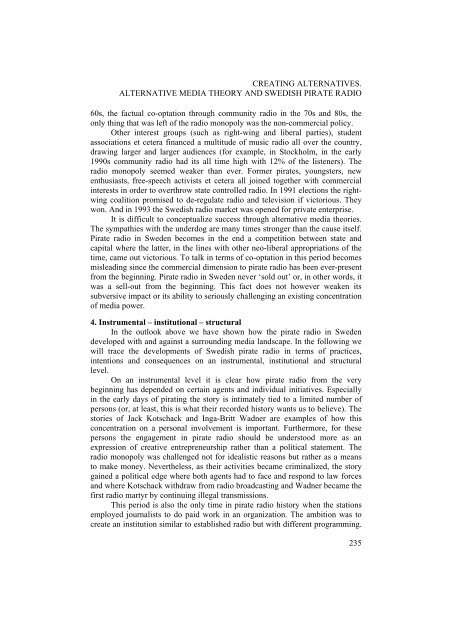culture, subculture and counterculture - Facultatea de Litere
culture, subculture and counterculture - Facultatea de Litere
culture, subculture and counterculture - Facultatea de Litere
You also want an ePaper? Increase the reach of your titles
YUMPU automatically turns print PDFs into web optimized ePapers that Google loves.
CREATING ALTERNATIVES.<br />
ALTERNATIVE MEDIA THEORY AND SWEDISH PIRATE RADIO<br />
60s, the factual co-optation through community radio in the 70s <strong>and</strong> 80s, the<br />
only thing that was left of the radio monopoly was the non-commercial policy.<br />
Other interest groups (such as right-wing <strong>and</strong> liberal parties), stu<strong>de</strong>nt<br />
associations et cetera financed a multitu<strong>de</strong> of music radio all over the country,<br />
drawing larger <strong>and</strong> larger audiences (for example, in Stockholm, in the early<br />
1990s community radio had its all time high with 12% of the listeners). The<br />
radio monopoly seemed weaker than ever. Former pirates, youngsters, new<br />
enthusiasts, free-speech activists et cetera all joined together with commercial<br />
interests in or<strong>de</strong>r to overthrow state controlled radio. In 1991 elections the rightwing<br />
coalition promised to <strong>de</strong>-regulate radio <strong>and</strong> television if victorious. They<br />
won. And in 1993 the Swedish radio market was opened for private enterprise.<br />
It is difficult to conceptualize success through alternative media theories.<br />
The sympathies with the un<strong>de</strong>rdog are many times stronger than the cause itself.<br />
Pirate radio in Swe<strong>de</strong>n becomes in the end a competition between state <strong>and</strong><br />
capital where the latter, in the lines with other neo-liberal appropriations of the<br />
time, came out victorious. To talk in terms of co-optation in this period becomes<br />
misleading since the commercial dimension to pirate radio has been ever-present<br />
from the beginning. Pirate radio in Swe<strong>de</strong>n never ‘sold out’ or, in other words, it<br />
was a sell-out from the beginning. This fact does not however weaken its<br />
subversive impact or its ability to seriously challenging an existing concentration<br />
of media power.<br />
4. Instrumental – institutional – structural<br />
In the outlook above we have shown how the pirate radio in Swe<strong>de</strong>n<br />
<strong>de</strong>veloped with <strong>and</strong> against a surrounding media l<strong>and</strong>scape. In the following we<br />
will trace the <strong>de</strong>velopments of Swedish pirate radio in terms of practices,<br />
intentions <strong>and</strong> consequences on an instrumental, institutional <strong>and</strong> structural<br />
level.<br />
On an instrumental level it is clear how pirate radio from the very<br />
beginning has <strong>de</strong>pen<strong>de</strong>d on certain agents <strong>and</strong> individual initiatives. Especially<br />
in the early days of pirating the story is intimately tied to a limited number of<br />
persons (or, at least, this is what their recor<strong>de</strong>d history wants us to believe). The<br />
stories of Jack Kotschack <strong>and</strong> Inga-Britt Wadner are examples of how this<br />
concentration on a personal involvement is important. Furthermore, for these<br />
persons the engagement in pirate radio should be un<strong>de</strong>rstood more as an<br />
expression of creative entrepreneurship rather than a political statement. The<br />
radio monopoly was challenged not for i<strong>de</strong>alistic reasons but rather as a means<br />
to make money. Nevertheless, as their activities became criminalized, the story<br />
gained a political edge where both agents had to face <strong>and</strong> respond to law forces<br />
<strong>and</strong> where Kotschack withdraw from radio broadcasting <strong>and</strong> Wadner became the<br />
first radio martyr by continuing illegal transmissions.<br />
This period is also the only time in pirate radio history when the stations<br />
employed journalists to do paid work in an organization. The ambition was to<br />
create an institution similar to established radio but with different programming.<br />
235












